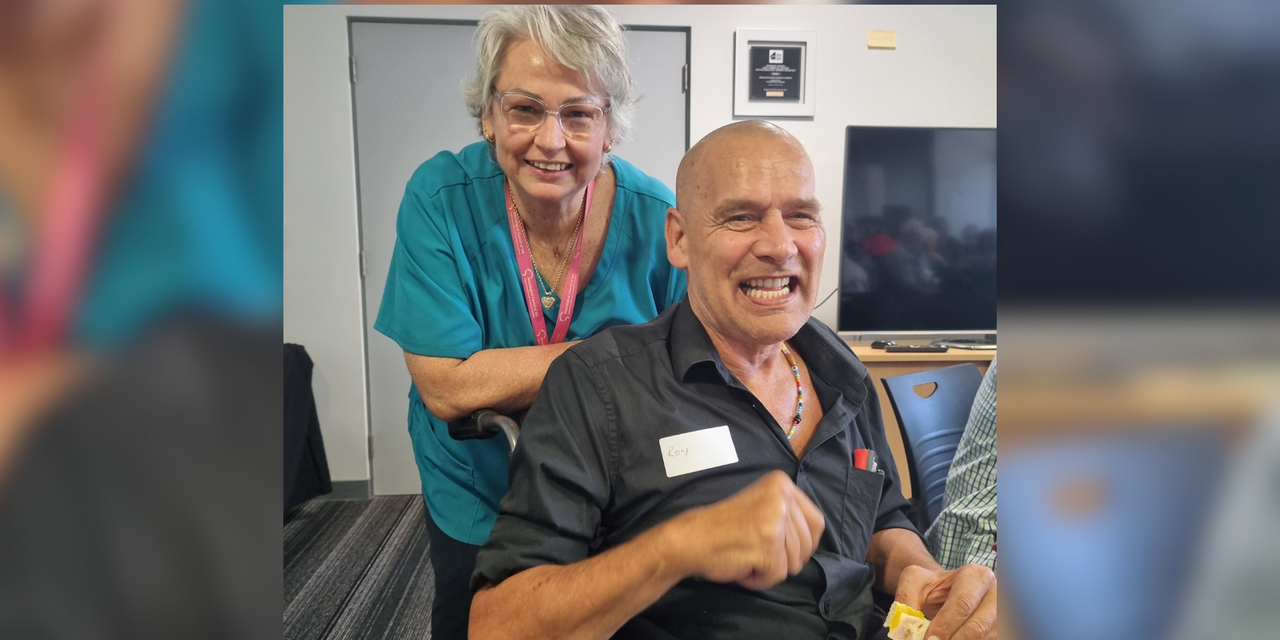Roy and Community Neurological Nurse, Deb Barndon at Geraldton NeuFriends Coffee Club
How acceptance, support and a positive mindset help Roy live with MND
Roy doesn’t shy away from the truth. Diagnosed with Motor Neurone Disease (MND), he hit rock bottom — emotionally and physically.
“Every morning was worse than the last,” he recalls. “I’d sit on the bed and think, I can’t get through today.” For two years, he lived in near-complete isolation, barely speaking to anyone, carrying the weight of his diagnosis in silence.
It hadn’t been a straightforward journey to that point. Before his diagnosis, Roy experienced a long period of uncertainty and misdiagnosis, which left him frustrated and disengaged with the health system. “They thought it was a stroke,” he says of the early symptoms. “But it kept getting worse.” By the time MND was confirmed, the condition had already impacted his independence — both physically and emotionally.
But everything changed when he finally accepted help.
At the centre of that turning point was Deb Barndon, a neurological nurse from the Neurological Council of WA’s NeuroCare — a nurse-led, community-based service funded by WA Health. “Without her, I don’t know where I’d be,” Roy says. “She didn’t give up on me. I wasn’t just another patient — she made sure I got the help I needed.”
Roy had previously rejected contact, but Deb kept messaging or calling. “She was persistent, and when I finally answered, it was the best thing I ever did.” Deb’s support helped him access the services he needed and cut through barriers he didn’t have the strength to navigate alone. “She’s not boxed in by the system. She works with it. That kind of care gives you your life back.”
Roy’s outlook today is unrecognisable from where he began. He speaks with warmth and energy, his humour and honesty shining through. “Once you accept it, you begin to live,” he says — a message he returns to often. “You stop focusing on what might happen, and start making the most of now,” he says. He even brings lightness to medical appointments. “I go to the doctor and say, ‘I just came in to see how you are doing.’ Then I sit back and wait for the reaction,” he laughs.
He’s now a regular at the NeuFriends Coffee Club — a support group run by the Neurological Council of WA for people with neurological conditions. “I didn’t want to go at first,” he admits. “But I started showing up — and it helped.” There, he found connection and understanding. “Everyone’s different, but they get it. There’s no judgement. It’s real.”
Roy now draws on a wide range of support — from allied health professionals to carers and community groups — and says it’s that combination that’s helped him feel in control again. “You’ve got to take what’s on offer. Sometimes it’s just a little thing that makes the day easier. It all adds up.”
For Roy, wellbeing isn’t just physical — it’s about the mind, the environment, and the people around you. “You can feel physically okay, but if your mind’s not in the right place, it’s just as hard,” he says. “When your mind feels good, everything changes.”
That mindset shift is clear when you meet him. Roy’s outlook is unshakeably positive and while his MND hasn’t gone away, the joy he finds in everyday moments is unmistakable.
He credits music, the outdoors, and small daily joys as part of what keeps him grounded. “You’ve got to do what lifts you,” he says. “A bit of sun, a good tune — whatever helps.”
His advice to others facing an MND diagnosis?
“Don’t give up. Say yes to help. Work out what makes you feel good. And get rid of the stuff — and the people — that drag you down.”
Roy’s story is a reminder that while MND can take away many things, it doesn’t take away the capacity to connect, adapt, and keep living with meaning.

